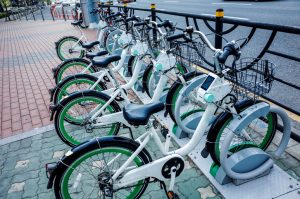 By David Sorrell, MOL
By David Sorrell, MOL
About 10 years ago, I received my undergrad from Northern Illinois University in DeKalb, Ill., about an hour west of Chicago. I was one of many without a car and getting around town, especially nights and weekends, was especially difficult. At the same time, I didn’t think the mobility spectrum would go beyond personal vehicles.
Fast-forward 10 years: The mobility spectrum has changed drastically. Personal travel has started to shift to more shared modes of travel. Cars, bikes, and even scooters can be accessed through a card, a cell phone, or even a fob. This has made access a lot more easier, but many people, including students, are left out of the equation because of where they live or their ability to afford and pay for such services.
When I took over the TDM program at UC Berkeley in 2017, I was presented with an opportunity to bridge that divide. Our regional bike-share network, FordGoBike (powered by Lyft/Motivate), (re)launched from the Bay Area Bike Share pilot and expand to five cities. If you happen to take a bike in Berkeley, you can opt to ride it to Emeryville or Oakland (adjacent cities); with the same membership, you can also access BikeShare stations in San Francisco and San Jose.
There’s an effort reach areas known as “communities of concern,” the Metropolitian Transportation Commission’s identified areas of low-income and minority populations. Ford GoBike provided low-income memberships to those who qualify (a $149 yearly membership for $5 the first year). I received a grant to provide qualified students (those with Pell and DREAM grants) the $5 fee and as a result, free bike-share.
Students who don’t qualify for this awesome program aren’t left out. The same grant opportunity offers all students a monthly discount.
Cal is one of the first colleges in the U.S. to offer such an exciting partnership and more than 1,000 students have taken advantage of it. Their trips replace vehicular modes including Uber and Lyft (no irony there). Plus, by communicating these programs to our Educational Opportunity Program students—many of whom are minority, low-income, first-generation, parents, active military— these groups can embrace bike-share as a program specifically for them. Once they make six figures, they can make bike-share part of their daily lives.
It’s important to link my experience as a broke college student with very limited forms of mobility beyond rollerblades and a roommate with a car with being able to offer students an opportunity to go further, faster, affordably.
David Sorrell, MOL, is transportation demand management administrator at UC Berkeley. He will present on this topic at the 2019 IPMI Conference & Expo, June 9-12 in Anaheim, Calif. For more information and to register, click here.
 Micro-mobility share has traditionally been managed by municipalities, campuses, or the agencies that brought it into a system. But one expert writes things like bike-share should be managed by transit agencies, and some are beginning to move in that direction.
Micro-mobility share has traditionally been managed by municipalities, campuses, or the agencies that brought it into a system. But one expert writes things like bike-share should be managed by transit agencies, and some are beginning to move in that direction.
 More people than ever are enjoying the convenience of shared-mobility services: transportation network companies (TNCs–Uber, Lyft, etc.), bike-share, scooter-share, and other easy ways to get around. Eric Haggett, senior associate with DESMAN and a member of IPMI’s Planning, Design, & Construction Committee, found himself pondering this recently and wondered if there isn’t more to it all than meets the eye:
More people than ever are enjoying the convenience of shared-mobility services: transportation network companies (TNCs–Uber, Lyft, etc.), bike-share, scooter-share, and other easy ways to get around. Eric Haggett, senior associate with DESMAN and a member of IPMI’s Planning, Design, & Construction Committee, found himself pondering this recently and wondered if there isn’t more to it all than meets the eye: By David Sorrell, MOL
By David Sorrell, MOL Micro-mobility can be tough to bring to smaller or economically challenged communities, whose populations may not use shared bikes or scooters enough to generate providers’ minimum required monthly per-ride charges. But a startup with a new model is emerging as a possible solution.
Micro-mobility can be tough to bring to smaller or economically challenged communities, whose populations may not use shared bikes or scooters enough to generate providers’ minimum required monthly per-ride charges. But a startup with a new model is emerging as a possible solution. By L. Dennis Burns, CAPP
By L. Dennis Burns, CAPP The Los Angeles Metro has added bike-share options to its Transit Access Pass (TAP) card accounts and plans to branch out to scooter-share, transportation network company (TNC) options, and even reserving a parking space with the card in the not-too-distant future.
The Los Angeles Metro has added bike-share options to its Transit Access Pass (TAP) card accounts and plans to branch out to scooter-share, transportation network company (TNC) options, and even reserving a parking space with the card in the not-too-distant future. That might have been fast: About a year after dockless bike-share started making headlines, many cities and suppliers are moving away from them, shifting their fleets to dockless e-bikes or scooters instead.
That might have been fast: About a year after dockless bike-share started making headlines, many cities and suppliers are moving away from them, shifting their fleets to dockless e-bikes or scooters instead. By Casey Jones, CAPP
By Casey Jones, CAPP New Orleans, La., jumped on the bike-share bandwagon just about a year ago, and while their blue shared bikes are a common enough sight downtown, lots of people haven’t tried them yet. So the city’s teamed up with Blue Cross and Blue Shield of Louisiana to get potential riders to try their blue bikes for the best price possible–free.
New Orleans, La., jumped on the bike-share bandwagon just about a year ago, and while their blue shared bikes are a common enough sight downtown, lots of people haven’t tried them yet. So the city’s teamed up with Blue Cross and Blue Shield of Louisiana to get potential riders to try their blue bikes for the best price possible–free.